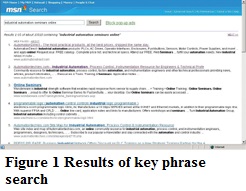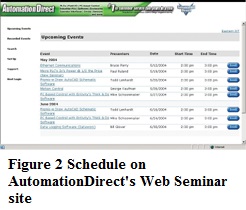The economy of the past three years has caused many businesses to exercise tighter control on their expenditures in areas such as travel to trade shows and expenses for training seminars or conferences. This comes at a time when it is more critical than ever for engineering and plant personnel to stay abreast of new products and technologies available for improving manufacturing processes. Concurrently, the Internet has become the number one source of information for those technical personnel with access to it. Its immediacy and abundance of accessible resources can accelerate the learning and purchasing processes for specifiers of automation equipment, which ultimately saves their company time and money.
One resource that is gaining widespread acceptance is Web-based training supplied by manufacturers and industry organizations such as the Instrumentation, Systems and Automation Society (ISA). The benefits of Web training include eliminating traveling time and expense to offsite locations, lower or no attendance fees, and the near-immediate availability of relevant topics, which reduces scheduling conflicts.
Web Seminar Technology
Most seminars are presented through a Web seminar hosting service to which the presenter has subscribed. Live Webcasts or seminars are events scheduled for a specific date and time, for which participants must register to obtain a “seat”. Seminars may be free or can cost hundreds of dollars for more in-depth technical topics. These presentations are viewed from your PC, and typically require executable software needed to display the event (usually free to download from the Web seminar hosting service) and a separate telephone line or a sound card and computer speakers for the audio. After registering for an event, you receive the Internet URL address for the seminar site and a telephone number to access the audio portion. Once logged and dialed in, you can view and hear the presentation, and can ask questions via the phone line or a chat option in the seminar window. The presentation can be a simple series of slides, or may utilize animation or streaming video. Typical seminars last from 15 minutes to one hour, including questions and answers from the audience.
Seminars may also be available from the provider’s site on an immediate basis by viewing a pre-recorded version streamed to your local PC. The benefit here is that you can view it when convenient, and as many times as desired. Of course, there is no real-time interaction with the “presenter” and any questions you have must be handled via an email or a phone call.
Types Of Web Seminars
Online seminars lend themselves best to technology briefs, product overviews, or a more detailed focus on one aspect of a topic. They can present material that might otherwise take an engineer days to gather, organize and study. Industry organizations tend to offer seminars on technical basics or emerging technologies and issues. According to www.isa.org, the Web site for the ISA, more than 12,000 manufacturing personnel participated in ISA Web seminars in 2003. The 90-minute seminars have covered a variety of technical topics and are led by ISA subject matter experts. Examples of topics include “Cyber Security Risk Assessment for Automation Systems”, “Overview of FOUNDATION Fieldbus Technology”, and “Boiler Control Fundamentals”.
At www.manufacturing.net, the umbrella Web site for the Reed Business Group’s collection of manufacturing-related publications (including Control Engineering, Modern Materials Handling and Plant Engineering), live Webcasts are broadcast periodically on topics such as “Radio Frequency Identification Systems: What You Need to Know to Get Started” and “Your Road Map for Project Management Success”. These seminars are also archived for viewing at the user’s convenience.
Supplier sites typically offer seminars that focus on product line overviews or application solutions using their products. For example, National Instruments, a large test and measurement equipment manufacturer, has an extensive schedule of seminars and interactive tutorials with titles such as “Essential Software Technologies for Automated Test” and “Automating Analog and Digital Measurements using LabVIEW 7.1”. Emerson Process Management operateswww.PlantWebUniversity.com, at which over 40 courses are available. The brief seminars cover topics such as selecting process automation networks, planning and implementing a fieldbus project, and stre amlining maintenance. AutomationDirect’s live Web seminars on automation products such as Ethernet-enabled PLCs, operator interfaces and data collection software offer the opportunity to get a product and application overview, as well as ask questions of the product manager or technical support specialist in attendance.
Finding The Seminar You Need

If there is a technical or product topic for which you hope to find a Web seminar available, you may have to do a little digging on the Internet to find it. Entering the key phrase
“industrial automation seminars online” into the Search box at www.msn.com returns a listing of relevant sites (Figure 1), although not necessarily every possibility available. If you want to learn about a new technology, an industry site or professional organization site will have offerings on broad topics. For example, if you want to learn about Profibus, one of the open digital communications systems being used as a control and I/O network on the factory floor, you might go to www.profibus.com, where their “Training” section describes the online eLearning courses available on the bus’ technical specifications and operation.

At the www.automationtechies.com Web site, their “Resources and Tools” section offers links to training offered by equipment suppliers, training organizations and professional societies. If you have specific product research in mind, your best bet is to go to the supplier’s Web site and search for “Web Seminars” or “Training”. From the home page of www.automationdirect.com, clicking the “Web Seminars” link brings you to their training site, with a listing of upcoming live seminars, as well as access to pre-recorded presentations (Figure 2).
If an online seminar is not available on your desired subject, many of the same organizations mentioned in this article also offer CD-based training and regional in-person workshops that, while requiring a little more time and expense, can provide a more in-depth presentation as well as hands-on interaction.
Conclusion
Web seminars have greatly increased the speed with which engineers can gain knowledge on topics or issues that arise on the job. From learning about a new technology that may apply to a manufacturing process to choosing the best products to implement that process, online learning has become an important tool in improving an engineer’s ability to make the best decisions that contribute to their company’s success.
By Shane Crider
AutomationDirect Online Training Coordinator

